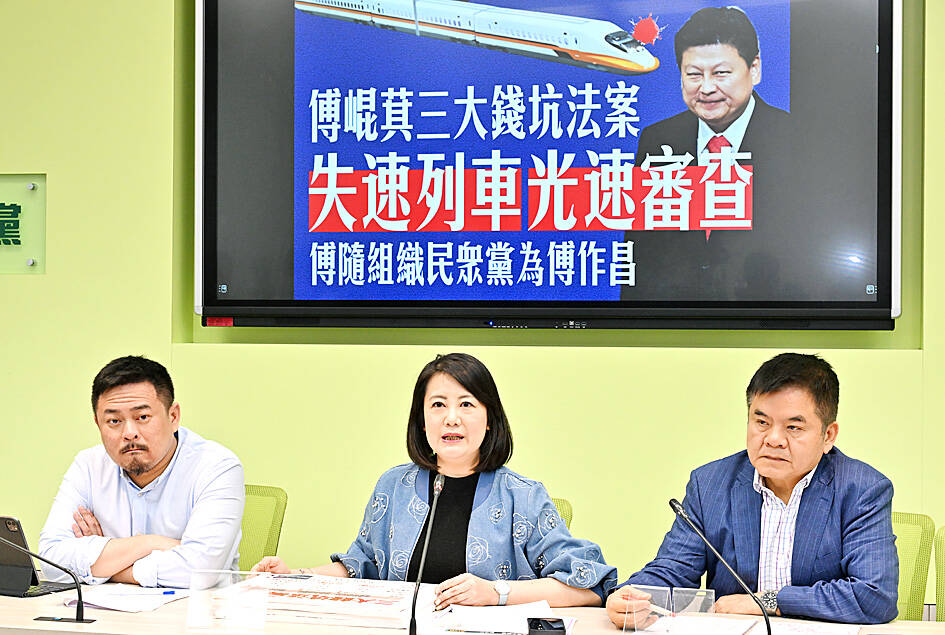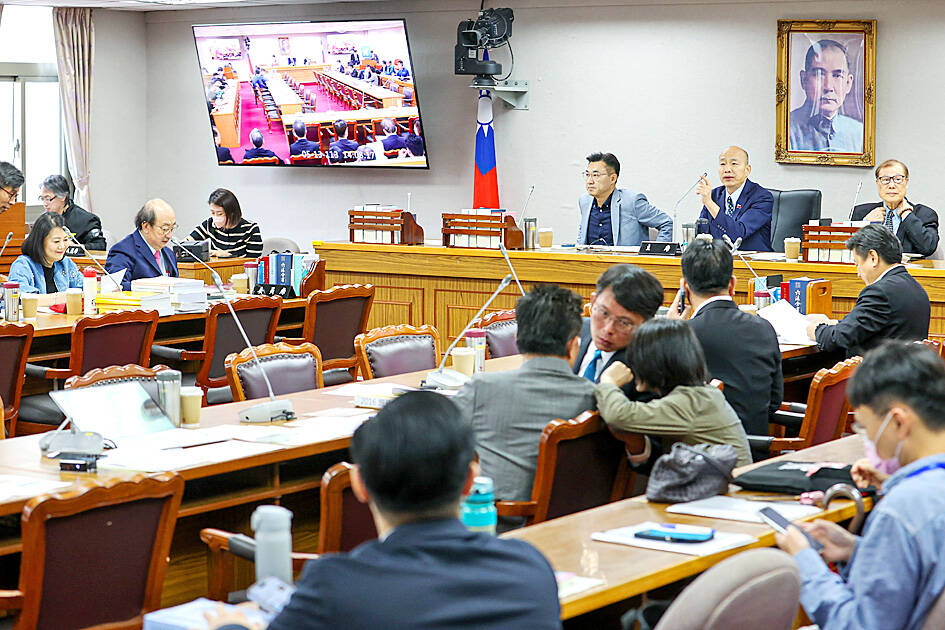The Democratic Progressive Party (DPP) caucus yesterday said it would ask the Executive Yuan to raise a motion to oppose the Chinese Nationalist Party (KMT) caucus’ infrastructure proposals and prepare to file for a constitutional interpretation if the KMT-dominated legislature forces their passage.
The DPP caucus described the three infrastructure plans for transportation links to eastern Taiwan proposed by the KMT as “three money pit projects” that would cost more than NT$2 trillion (US$61.72 billion).
It would ask the Executive Yuan to oppose public projects that would drain state financial resources, DPP caucus secretary-general Rosalia Wu (吳思瑤) said.

Photo: Tien Yu-hua, Taipei Times
It would also file for a constitutional interpretation if KMT lawmakers push the proposals through by making them special statute bills, she added.
The three bills propose constructing an expressway for Hualien and Taitung counties to link to the national highway system with an estimated budget of NT$250 billion; building a high-speed rail system in eastern Taiwan that would link to the national line at a cost of NT$1 trillion; and extending Freeway No. 6 (also known as the Central East West Freeway) for vehicle traffic between Taichung City and Puli (埔里), which would run through the Central Mountain Range and end in Hualien City at a cost of more than NT$800 billion.
DPP legislators oppose these “three money pit projects” as they lack input from transportation and engineering experts, disregard environmental impact assessments, are devoid of transparency and financial accountability, and had bypassed the deliberation process in the legislature, Wu said.

Photo: CNA
Moreover, the construction of these projects would pass through indigenous land, which requires the consent of indigenous communities as stipulated in the Indigenous Peoples Basic Act (原住民族基本法), DPP lawmakers said.
Building transportation links through the earthquake-active zones of the Hualien-Taitung Rift Valley (花東縱谷) and the east coast region also poses a geohazard, they said.
On the fiscal front, the proposed projects would contravene Article 70 of the Constitution, which stipulates: “The Legislative Yuan shall not make proposals for an increase in the expenditures in the budgetary bill presented by the Executive Yuan,” Wu said.
KMT caucus whip Fu Kun-chi (傅?萁), a former Hualien county commissioner, yesterday said he is fighting for public projects and improved transportation links to bring economic prosperity, enhance travel safety and improve the livelihoods of Hualien County residents.
Taiwan People’s Party caucus whip Huang Kuo-chang (黃國昌) said he supports the KMT’s proposals, but added that he has asked for additional clauses to ensure fiscal restraint so that the projects would not sink into debt or use the state’s special funds.

CHAOS: Iranians took to the streets playing celebratory music after reports of Khamenei’s death on Saturday, while mourners also gathered in Tehran yesterday Iranian Supreme Leader Ayatollah Ali Khamenei was killed in a major attack on Iran launched by Israel and the US, throwing the future of the Islamic republic into doubt and raising the risk of regional instability. Iranian state television and the state-run IRNA news agency announced the 86-year-old’s death early yesterday. US President Donald Trump said it gave Iranians their “greatest chance” to “take back” their country. The announcements came after a joint US and Israeli aerial bombardment that targeted Iranian military and governmental sites. Trump said the “heavy and pinpoint bombing” would continue through the week or as long

TRUST: The KMT said it respected the US’ timing and considerations, and hoped it would continue to honor its commitments to helping Taiwan bolster its defenses and deterrence US President Donald Trump is delaying a multibillion-dollar arms sale to Taiwan to ensure his visit to Beijing is successful, a New York Times report said. The weapons sales package has stalled in the US Department of State, the report said, citing US officials it did not identify. The White House has told agencies not to push forward ahead of Trump’s meeting with Chinese President Xi Jinping (習近平), it said. The two last month held a phone call to discuss trade and geopolitical flashpoints ahead of the summit. Xi raised the Taiwan issue and urged the US to handle arms sales to

BIG SPENDERS: Foreign investors bought the most Taiwan equities since 2005, signaling confidence that an AI boom would continue to benefit chipmakers Taiwan Semiconductor Manufacturing Co’s (TSMC, 台積電) market capitalization swelled to US$2 trillion for the first time following a 4.25 percent rally in its American depositary receipts (ADR) overnight, putting the world’s biggest contract chipmaker sixth on the list of the world’s biggest companies by market capitalization, just behind Amazon.com Inc. The site CompaniesMarketcap.com ranked TSMC ahead of Saudi Aramco and Meta Platforms Inc. The Taiwanese company’s ADRs on Tuesday surged to US$385.75 on the New York Stock Exchange, as strong demand for artificial intelligence (AI) applications led to chip supply constraints and boost revenue growth to record-breaking levels. Each TSMC ADR represents

Pro-democracy media tycoon Jimmy Lai’s (黎智英) fraud conviction and prison sentence were yesterday overturned by a Hong Kong court, in a surprise legal decision that comes soon after Lai was jailed for 20 years on a separate national security charge. Judges Jeremy Poon (潘兆初), Anthea Pang (彭寶琴) and Derek Pang (彭偉昌) said in the judgement that they allowed the appeal from Lai, and another defendant in the case, to proceed, as a lower court judge had “erred.” “The Court of Appeal gave them leave to appeal against their conviction, allowed their appeals, quashed the convictions and set aside the sentences,” the judges